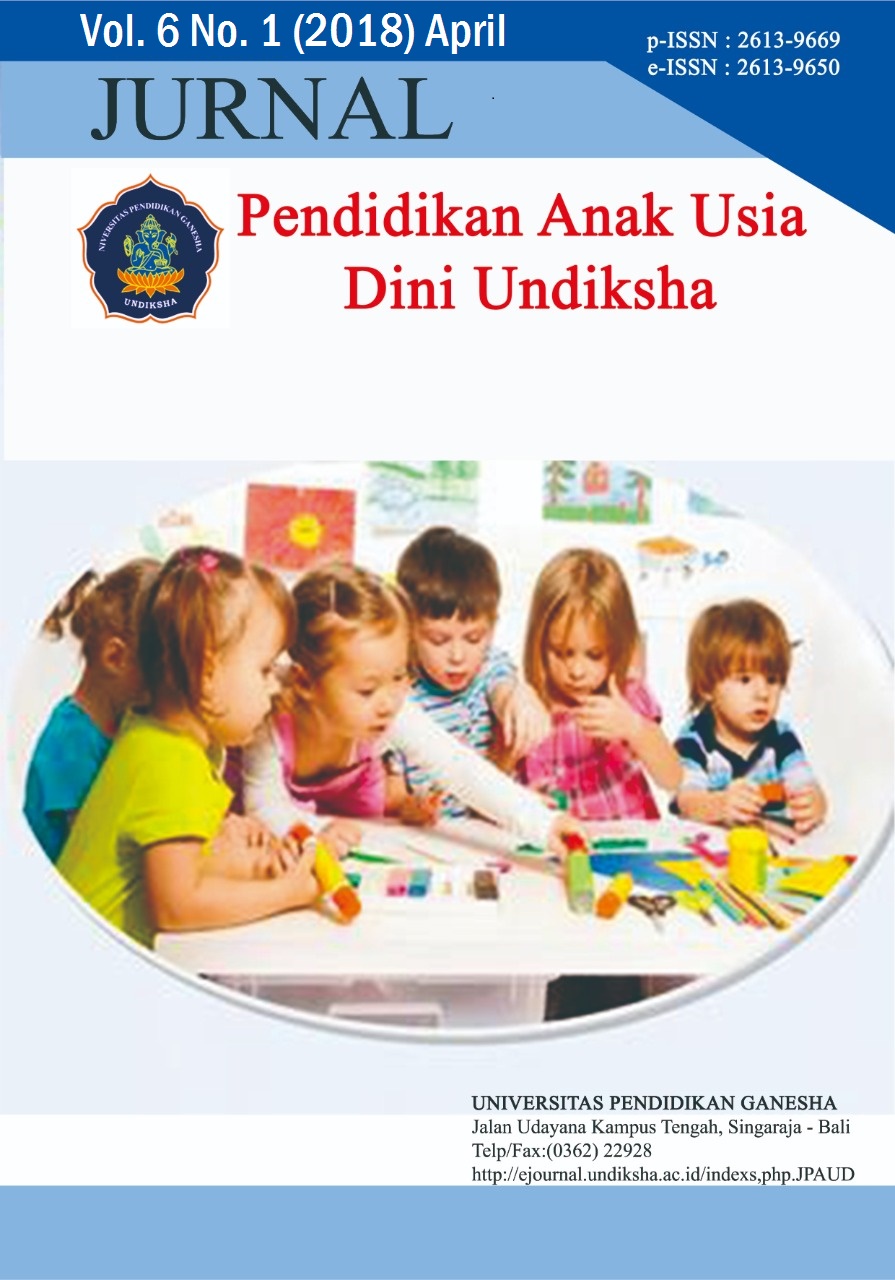*Pengaruh Cerita Pendek Berbasis Kearifan Lokal Terhadap Kemampuan Empati Anak Kelompok B PAUD Gugus Anggrek Kecamatan Kuta Utara Tahun Pelajaran 2017/2018
DOI:
https://doi.org/10.23887/paud.v6i1.15093Abstract
Penelitian ini bertujuan untuk mengetahui pengaruh cerita pendek berbasis kearifan lokal terhadap kemampuan empati anak kelompok B PAUD Gugus Anggrek Kecamatan Kuta Utara Tahun Pelajaran 2017/2018. Penelitian ini merupakan eksperimen semu (Quasi Eksperiment) dengan Nonequivalent Control Group Design. Populasi penelitian ini berjumlah 457 anak. Pengambilan sampel dilakukan secara random. Sampel penelitian ini adalah anak kelompok B3 TK Pradnyandari II berjumlah 18 anak sebagai kelompok eksperimen dan anak kelompok B1 TK Widya Maha Gangga berjumlah 16 anak sebagai kelompok kontrol. Data dikumpulkan dengan teknik observasi dan selanjutnya dianalisi dengan uji-t. Berdasarkan hasil analisis data diperoleh thitung = 4,39, sedangkan pada taraf signifikansi 5% dengan dk = 32 diperoleh nilai ttabel = 2,042 sehingga thitung = 4,39 > ttabel = 2,042. Berdasarkan kriteria pengujian, maka Ho ditolak dan Ha diterima. Adapun nilai rata-rata kemampuan empati pada kelompok eksperimen adalah = 81,39 , sedangkan pada kelompok kontrol adalah = 67,69. Berdasarkan hasil penelitian tersebut dapat disimpulkan bahwa terdapat pengaruh cerita pendek berbasis kearifan lokal yang diterapkan selama proses pembelajaran terhadap kemampuan empati anak kelompok B PAUD Gugus Anggrek Kecamatan Kuta Utara Tahun Pelajaran 2017/2018.Kata Kunci : Kemampuan Empati, Cerita Pendek, Berbasis Kearifan Lokal, Metode Bercerita
*This study aims to determine the effect of short stories based on local wisdom on the ability of children's empathy group B PAUD Anggrek Cluster Kecamatan Kuta Utara Lesson Year 2017/2018. This research is a quasi experiment (Quasi Experiment) with Nonequivalent Control Group Design. The population of this study amounted to 457 children. Sampling is done randomly. The sample of this research is children of B3 TK Pradnyandari II group of 18 children as experiment group and children of B1 TK Widya Maha Gangga group of 16 children as control group. Data were collected by observation technique and then analyzed by t-test. Based on the results of data analysis obtained t count = 4.39, while at the level of significance of 5% with dk = 32 obtained ttable = 2,042 so thitung = 4.39> ttable = 2.042. Based on the testing criteria, Ho is rejected and Ha accepted. The mean value of empathy ability in the experimental group is = 81.39, while in the control group is = 67,69. Based on the results of this study can be concluded that there is the influence of short stories based on local wisdom that is applied during the learning process of the ability of children's empathy group B PAUD Anggrek Cluster Kecamatan Kuta Utara Lesson Year 2017/2018
keyword : *Empathy Capabilities, Short Stories, Local Wisdom-Based, Storytelling Method
Downloads
Published
2018-07-26
How to Cite
., N. K. D. A. S., ., L. A. T. S., & ., D. S. P. M. (2018). *Pengaruh Cerita Pendek Berbasis Kearifan Lokal Terhadap Kemampuan Empati Anak Kelompok B PAUD Gugus Anggrek Kecamatan Kuta Utara Tahun Pelajaran 2017/2018. Jurnal Pendidikan Anak Usia Dini Undiksha, 6(1), 74–83. https://doi.org/10.23887/paud.v6i1.15093
Issue
Section
Articles
License
Authors who publish with the Jurnal Pendidikan Anak Usia Dini Undiksha agree to the following terms:
- Authors retain copyright and grant the journal the right of first publication with the work simultaneously licensed under a Creative Commons Attribution License (CC BY-SA 4.0) that allows others to share the work with an acknowledgment of the work's authorship and initial publication in this journal.
- Authors are able to enter into separate, additional contractual arrangements for the non-exclusive distribution of the journal's published version of the work (e.g., post it to an institutional repository or publish it in a book), with an acknowledgment of its initial publication in this journal.
- Authors are permitted and encouraged to post their work online (e.g., in institutional repositories or on their website) prior to and during the submission process, as it can lead to productive exchanges, as well as earlier and greater citation of published work. (See The Effect of Open Access)











